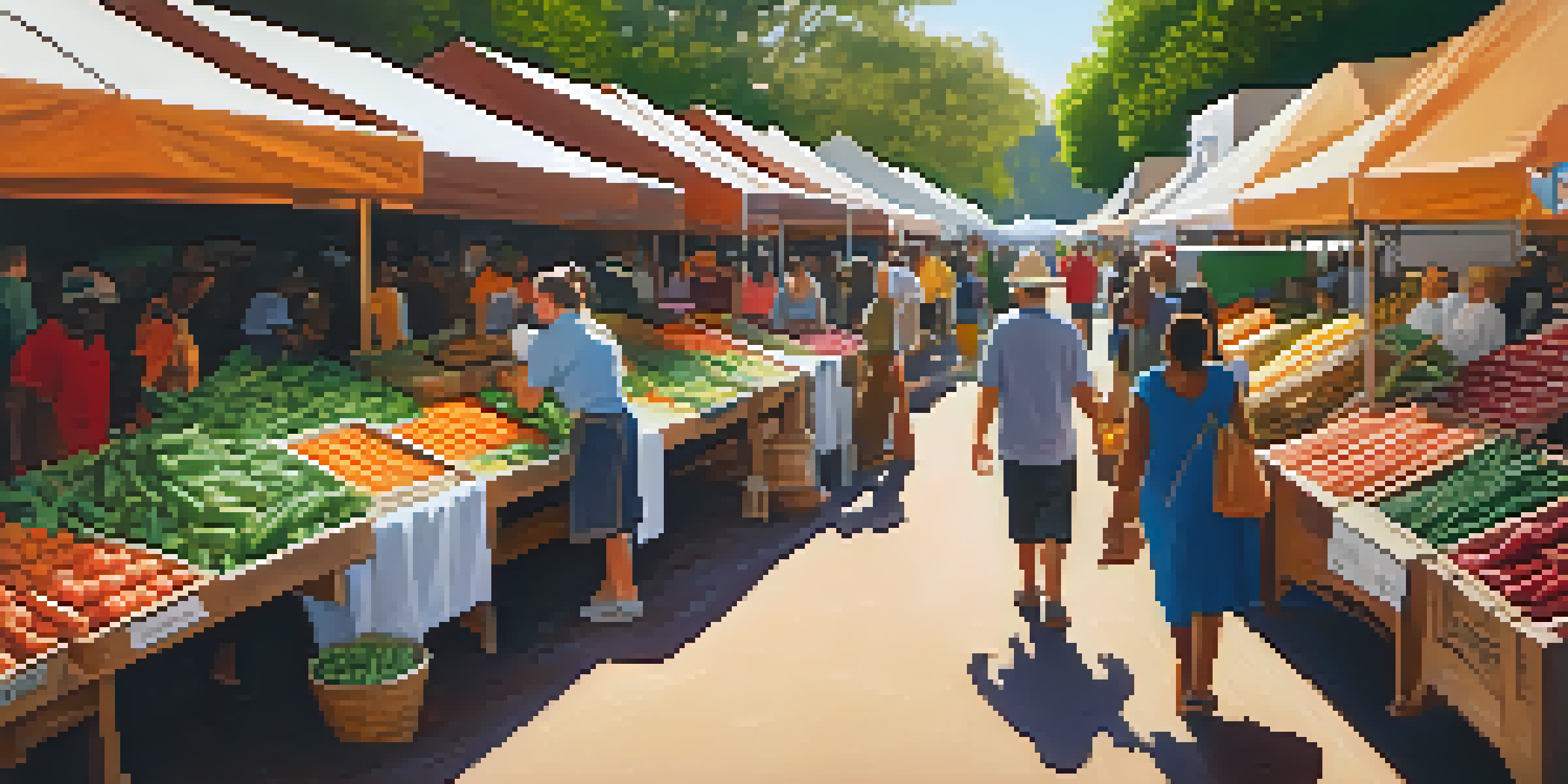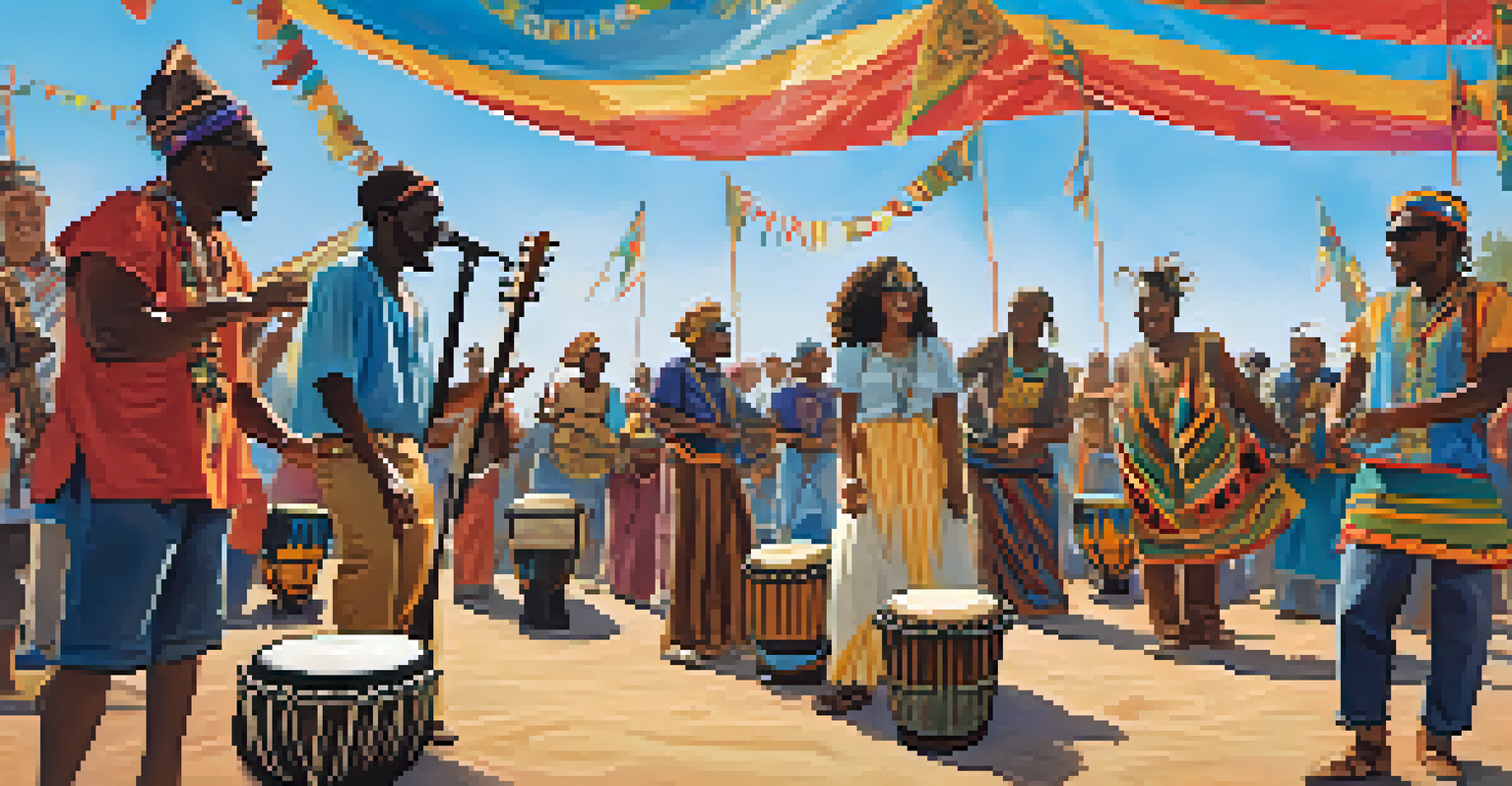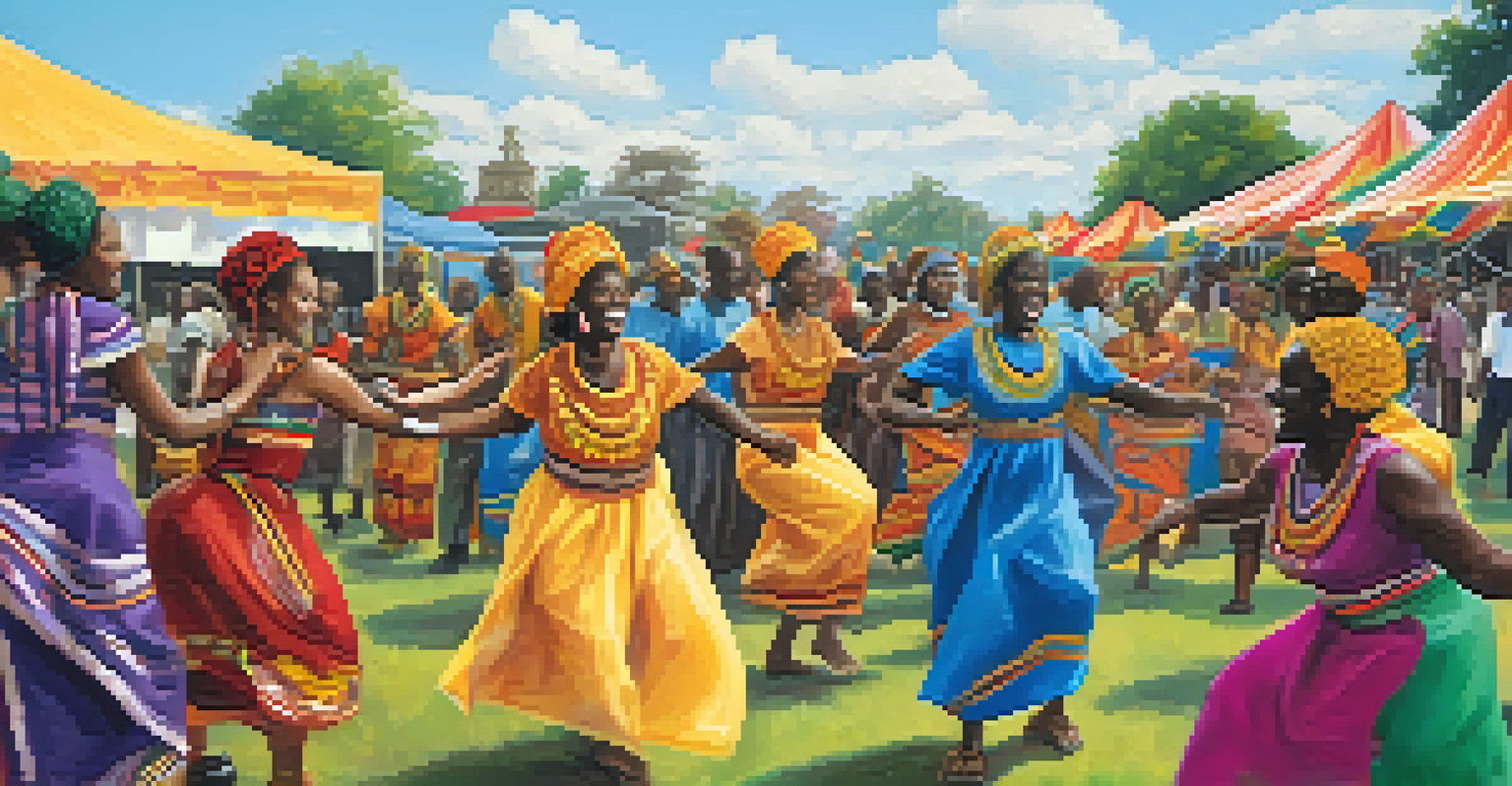The Role of African Traditions in Shaping California's Culture

Historical Roots of African Traditions in California
California's cultural tapestry is woven with many threads, one of which is the rich heritage of African traditions. These traditions date back to the early days of the Gold Rush when African Americans began migrating to the state, bringing with them unique customs, music, and culinary practices. Over the years, these early influences laid the groundwork for a diverse cultural exchange that would flourish in the region.
Music is the shorthand of emotion.
The arrival of enslaved Africans, followed by free Black individuals, introduced various practices that have been integrated into California's culture. Their impact can be seen in everything from music genres like jazz and blues to unique culinary dishes that celebrate African flavors. This blending of traditions has not only enriched local culture but has also created a lasting legacy.
As California continued to grow, these African traditions evolved, adapting to the new environment while maintaining their core essence. Festivals, art forms, and community gatherings emerged, showcasing the influence of African heritage. This dynamic interplay has played a crucial role in shaping California's identity.
Culinary Influences: A Taste of Africa
One of the most delicious ways African traditions have shaped California is through its vibrant culinary scene. Dishes like gumbo and jambalaya emerged from African roots and have been embraced by Californians, showcasing a fusion of flavors. Local farmers' markets often feature ingredients that are staples in African cuisine, such as okra, yams, and collard greens.

California's food culture thrives on diversity, and African-inspired restaurants pop up in cities like Los Angeles and San Francisco, offering mouthwatering dishes that tell stories of their origins. The blending of African cooking techniques with California's fresh ingredients has given rise to a unique culinary identity. This blend demonstrates how food can act as a bridge between cultures, inviting everyone to experience the richness of African heritage.
African Traditions Shape California
The rich heritage of African traditions has significantly influenced California's cultural landscape, from music and art to culinary practices.
Moreover, food festivals celebrating African culinary traditions attract people from all walks of life, creating a sense of community and appreciation for this vibrant culture. These events not only highlight African cuisine but also educate attendees about the history and significance behind each dish, fostering a deeper understanding of the cultural ties.
Music: The Heartbeat of African Influence
Music in California is a vibrant expression of its diverse population, and African traditions play a significant role in this soundscape. Genres like jazz, funk, and hip-hop have roots in African musical forms, which have been adapted and transformed by California's artists. This connection between African rhythms and contemporary music creates a unique blend that resonates with audiences.
Food is our common ground, a universal experience.
Local music festivals often feature artists who incorporate African instruments and rhythms into their performances, showcasing the cultural exchange that continues to thrive. For instance, the use of drums in both traditional African music and modern Californian genres highlights this synergy. Through music, stories of struggle, celebration, and community are shared, allowing for a deeper connection among listeners.
Furthermore, community organizations often host workshops and events that focus on African music and dance, inviting participants to engage with these rich traditions. This not only preserves the heritage but also encourages the next generation to appreciate and continue these artistic expressions. The rhythm of African traditions is undeniably woven into the fabric of California's musical landscape.
Art and Expression: Visual Influences from Africa
The art scene in California has been profoundly influenced by African traditions, with artists drawing inspiration from the continent's rich history. From textiles to sculptures, African motifs and techniques can be found throughout galleries and public spaces. This artistic expression serves as a powerful reminder of the interconnectedness of cultures.
Many California artists of African descent incorporate storytelling into their work, reflecting personal experiences and cultural heritage. This approach not only honors their ancestry but also invites viewers to engage with the narratives presented. Art becomes a medium for dialogue, fostering understanding and appreciation across diverse communities.
Culinary Scene Embraces African Roots
California's food culture showcases a vibrant fusion of African culinary traditions, highlighting dishes like gumbo and jambalaya, and fostering community through food festivals.
Exhibitions featuring African art often encourage collaboration between artists from different backgrounds, creating a dynamic exchange of ideas and techniques. Such initiatives not only celebrate African traditions but also contribute to a broader dialogue about identity and cultural heritage in California. The visual arts continue to serve as a vibrant testament to the enduring influence of African traditions.
Festivals Celebrating African Heritage in California
California hosts numerous festivals that celebrate African heritage, bringing together communities to honor their shared history and culture. Events like the African American Art & Culture Complex Festival in San Francisco showcase music, dance, and art, emphasizing the importance of preserving African traditions. These gatherings serve as joyous celebrations of identity and heritage.
At these festivals, attendees can experience a variety of activities, including traditional dance performances, storytelling sessions, and culinary tastings. This immersive experience allows people to connect with African culture on a deeper level, fostering appreciation and respect. Families often attend together, creating lasting memories while learning about their roots.
Moreover, these festivals create networking opportunities for artists, musicians, and community leaders, strengthening the bonds within the African diaspora. They also encourage collaboration with other cultural groups, promoting unity and understanding. Through celebration, these events highlight the vital role of African traditions in shaping California's cultural landscape.
Language and Dialogue: The Legacy of African Languages
Language is a powerful tool for cultural expression, and African languages have left an indelible mark on California's linguistic landscape. Many African American communities in California have retained elements of African languages, influencing local dialects and expressions. This linguistic legacy enriches California’s cultural dialogue and provides insight into the state's diverse history.
Expressions from African languages can often be heard in everyday conversations, music, and storytelling, weaving a rich tapestry of cultural identity. Moreover, initiatives to teach African languages in schools and community centers help preserve this linguistic heritage for future generations. Such efforts highlight the importance of language in maintaining cultural connection.
Community and Resilience in Culture
African traditions foster a strong sense of community in California, promoting solidarity and engagement through cultural events and initiatives.
As California continues to evolve, the blending of African languages with other linguistic influences creates a unique dialect that reflects the state’s diversity. This dynamic interplay fosters a deeper understanding of the cultural narratives that shape California, reminding us of the importance of embracing and celebrating our linguistic heritage.
Community Resilience: The Impact of African Traditions
The resilience of African traditions is evident in the strong sense of community found throughout California. These traditions have fostered networks of support among individuals and families, creating spaces where cultural identity can thrive. Community organizations often draw on African values to promote solidarity and empowerment, contributing to social cohesion.
Through shared experiences and collective memory, African traditions continue to serve as a source of strength for many Californians. Events like community dialogues and workshops encourage individuals to explore their heritage and find common ground. This sense of belonging is essential in a state as diverse as California, where various cultures intersect.

Additionally, the legacy of African traditions motivates community engagement, as individuals are inspired to give back and support one another. Initiatives focused on education, health, and the arts often reflect African principles of community care and collaboration. This enduring impact underscores the vital role that African traditions play in shaping a resilient and inclusive California.